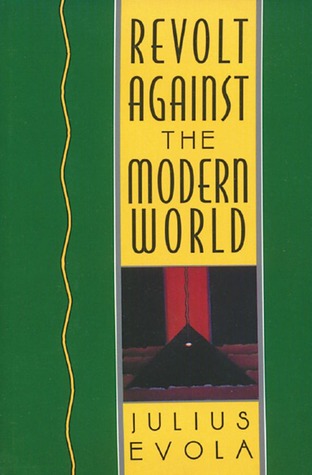Revolt Against the Modern World is a book by Julius Evola, first published in Italy in 1934. Described as Evola's most influential work, it is an elucidation of his Traditionalist world view.
At turns prophetic and provocative, Revolt against the Modern Worldoutlines a profound metaphysics of history and demonstrates how and why we have lost contact with the transcendent dimension of being. The revolt advocated by Evola does not resemble the familiar protests of either liberals or conservatives. His criticisms are not limited to exposing the mindless nature of consumerism, the march of progress, the rise of technocracy, or the dominance of unalloyed individualism, although these and other subjects come under his scrutiny. Rather, he attempts to trace in space and time the remote causes and processes that have exercised corrosive influence on what he considers to be the higher values, ideals, beliefs, and codes of conduct--the world of Tradition--that are at the foundation of Western civilization and described in the myths and sacred literature of the Indo?Europeans. Agreeing with the Hindu philosophers that history is the movement of huge cycles and that we are now in the Kali Yuga, the age of dissolution and decadence, Evola finds revolt to be the only logical response for those who oppose the materialism and ritualized meaninglessness of life in the twentieth century.
My notes
==[ Notes ]====================================================================| Like many authors that critique the "modern world", the criticisms are very well articulated, grounded, and are those I agree with. The mindset and actions he describes to be taken on, at an individual level, I agree with. What Evola suggests as the "ideal" society though I do not. I do not agree with his views that Kings really had divine right, that caste societies really are best, and generally overall disagree with his opinions on the best way to structure society. Evola certainly was a Fascist, a fascist disliked by all his other fascist contemporaries for his "too strange" or "too soft" ideas, sure, but still a fascist. This is the only book of Evolas I've read so maybe his thoughts changed after WW2. It was still an interesting read and it definitely challenged some of my existing views. It had me think upon things I hadn't ever really considered, and although Evola hasn't really changed my mind on anything he has given me new opinions on things that I otherwise had paid no mind to prior. :: Notable Assertions :: > Without thinking of success or failure, do what needs to be done. > The ultimate realization of a human being is achieved through education. > Power is feminine, it comes to the strong, not those that seek it. > Dont reject the modern and material world, rather seat yourself on the beasts back and rush with it. When it inevitably becomes weak and tired from its wild running, unmount and overcome it. > Strive for self-sufficiency, independence, and self-liberation. > The Material World is the Modern World. The Spiritual World is the Traditional World. > Traditional living is ascetic and spiritual. It is focused on just 'being', not achieving, but living a unified and spiritually in-tune life harmonious with environment and neighbors. > Dont place movements in wordly reactions, no, place them in action of transcendental principles. # Everyone is a reactionary. Movements that are a reaction to a problem have # their scope limited by that problem. Social movements that dislike their # current society and wish to change it can only change in relation to the # existing society they dislike so much. Have a vision in a vaccum, based on # values and history, pursue its realization. Do not set to change the things # you dislike, set to make the things you love. > Spirit <-> Intellect <-> Material
